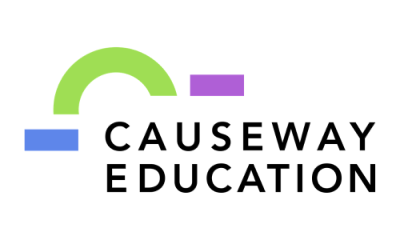Causeway Education: Safeguarding Policy
This policy was last updated in May 2025
A) Introduction
We believe that a child or young person should never experience abuse of any kind. We all have a responsibility to promote the welfare of all children and young people and to keep them safe. We are committed to practice in a way that protects them.
The purpose of this policy is a) to protect children and young people who take part in our programmes and events and b) to provide staff and those to whom this policy applies with the overarching principles that guide our approach to child protection.
B) Legal Framework
This policy has been drawn up on the basis of law and guidance that seeks to protect children, namely:
Children Act (1989)
United Convention of the Rights of the Child (1991)
Sexual Offences Act (2003)
Children Act (2004)
Protection of Freedoms Act (2012)
Data Protection Act (2018)
Online Safety Bill (2023)
Relevant government guidance on safeguarding children incl. Keeping Children Safe in Education September (2024)
C) We recognise that:
the welfare of the child is paramount, as enshrined in the Children Act 1989
all children, regardless of age, disability, gender, racial heritage, religious belief, sexual orientation or identity, have a right to equal protection from all types of harm or abuse
safeguarding children is everybody’s business
adults engaged in positions of trust towards children must exercise the highest levels of integrity and good practice.
D) We will seek to keep children and young people safe by:
valuing them, listening to and respecting them
adopting child protection practices through procedures and a code of conduct for staff, contractors and volunteers
developing and implementing an effective e-safety policy and related procedures
providing effective management for staff, contractors and volunteers through supervision, support and training
recruiting staff, contractors and volunteers safely, ensuring all necessary checks are made
sharing information about child protection and good practice with children, parents, staff, contractors and volunteers
sharing concerns with agencies who need to know, and involving parents and children appropriately.
E) E-safety
All internet and telephone communication with students will take place in secure, approved channels or via school staff or parents.
Students will be notified of the role and existence of the Designated Safeguarding Lead and Deputy Designated Safeguarding Leads at the beginning of the programme and encouraged to contact via the appropriate channels if they have any concerns.
Designated staff will have access to or monitor online interactions.
F) Scope
This policy applies equally to remote and on-site interactions and to:
All staff employed or engaged by us, including interns
Board members
Volunteers and visitors (such as donors) to our programmes who may be in contact with children
Consultants and contractors who are defined as working with children
Organisations that run programmes on our behalf or in partnership with us that are defined as working with children
G) Definitions
Child is someone under the age of 18
Child abuse is when any child is being harmed. Abuse can be physical, sexual, or emotional, or take the form of neglect.
Working with children is defined as those who are engaged in an activity on behalf of or funded by us that involves direct contact with, or facilitates access to, children.
H) Code of conduct
Everyone who is covered by this policy commits to respecting, promoting, upholding and protecting, at all times, the rights of the child as set out in the UN Convention on the Rights of the Child. Anyone found to be in breach of our Code of Conduct will be subject to disciplinary action which may include dismissal or termination of employment or other arrangement with us.
Everyone covered by this policy should always follow the guidelines below when interacting directly with children and young people in any capacity on behalf of the Causeway Education.
1. Prioritise the safety and wellbeing of the child at all times.
2. For in-person interactions, never take sole responsibility for a child; if a child needs care, alert the parent or chaperone.
3. For in-person interactions, only take on practical caring responsibilities, for example, taking a child to the toilet, in an emergency. The default position should be to avoid one-to-one scenarios and seek support.
4. Never give out your personal contact details, and do not 'friend' or 'follow' children you are supporting on social networking sites.
5. Remember they are children first, and contributors or participants second.
6. Never lose sight of the fact that you are with, or interacting with, children - behave appropriately and use appropriate language at all times.
7. Listen to and respect children at all times; don't patronise them.
8. Avoid favouritism, and treat children and young people fairly and without prejudice or discrimination.
9. Always act within professional boundaries; ensure all contact with children is essential to the programme / event / activity / project you are working on.
10. If you feel anyone is behaving inappropriately around children, you have a duty to report your concern through the Causeway Education’s Safeguarding Procedure (available below).
I) Partner organisations
All formal or contractual arrangements with partners, individuals, groups or organisations which come into contact with children must include agreement on the rules in this Safeguarding Policy. Partners must adopt this policy or have developed their own policy of a similar standard. Partnership agreements must contain agreed procedures for reporting and investigating concerns involving safeguarding.
J) Recruitment
At least one member of staff on every interview panel must be Safer Recruitment trained and apply these principles throughout the recruitment process.
All new staff, including freelancers and trustees, must be in possession of a valid DBS certificate or be actively registered on the DBS Update Service. Causeway Education define a valid DBS check as an enhanced certificate that has been issued within the last 3 years. In the event that a certificate would be older than 3 years during associated project delivery, a new certificate would be required.
New members of staff cannot begin work with children until they are in possession of a valid DBS certificate.
K) Training
All staff will be trained in this policy and related procedures on induction, and must undergo refresher training every two years. All staff are provided with regular informal training and policy updates via our bi-monthly team meetings.
The Causeway Education Safeguarding Procedure
If you are worried about a child it is your professional duty to report your concerns.
All staff of the Causeway Education have a duty of care for the physical and mental well-being of all children we work with. For the purposes of this procedure, a child is defined as someone under the age of 18, but you must also apply this duty of care to students you are working with who have had their 18th birthday in the academic year.
All adults working for or with us must report concerns about a child, no matter how insignificant that concern might seem.
All staff must follow this procedure when working with children. If you are working with children through a school or college, that institution’s safeguarding policy also applies; you must ensure you familiarise yourself with it before starting work and be aware of the local Safeguarding Focal Point.
Definitions
Child is someone under the age of 18
Staff are all staff employed or engaged by us, including interns; board members and trustees; volunteers and visitors (such as donors) to our programmes who may be in contact with children; consultants and contractors who are defined as working with children; organisations that run programmes on our behalf or in partnership with us that are defined as working with children
Working with children is defined as those who are engaged in an activity on behalf of our funded by us that involves direct contact with, or facilitates access to, children.
Children taking part in our programmes
Staff members working directly with children on our programmes must make them aware of the name and contact details of the Causeway Education’s Safeguarding Officer (details below) and told to contact them if they have any concerns
Disclosure
If a child discloses to you that they are being abused, or that they have concerns about someone else, follow these guidelines:
Allow the child to talk freely; do not put words into their mouth.
Do not promise to keep a secret.
Reassure the child that what has happened is not their fault and that they were right to tell someone.
Don’t criticise the alleged perpetrator.
Explain you must share the information with the appropriate person in the child’s school (if applicable) and at the Causeway Education.
Make a formal record, using the child’s words where possible, and pass it onto the Designated Safeguarding Lead at the school (if applicable) and at the Causeway Education.
Concerns
If you are worried about a child, it is your professional duty to report your concerns. You do not need to make a judgment; we have professionally-trained staff who will escalate your concerns if necessary.
There are four official categories of child abuse:
Physical abuse - possible signs are bruises, burns, cuts, marks, frequent accidents, unexplained injuries, aggressive play or behaviour.
Neglect - possible signs are hunger, poor hygiene, poor attendance, tiredness, appearing withdrawn, poor achievement, poor appearance.
Emotional abuse - possible signs are mood swings, poor relationships, excessive fear or anxiety, low self-esteem, being withdrawn or passive, dominating behaviour.
Sexual abuse - possible signs are inappropriate sexual behaviour, inappropriate sexual language, self-harm, recurrent pains, pregnancy.
Additionally, safeguarding frameworks also highlight other specific safeguarding issues that fall under the above categories, such as:
Child criminal exploitation (CCE)
Child sexual exploitation (CSE)
Domestic abuse
Honour-based violence (HBV)
Radicalisation
All staff should be aware that mental health problems can, in some cases, be an indicator that a child has suffered or is at risk of suffering abuse, neglect or exploitation.
Monitoring, Reporting and referral
If a child is in immediate danger you must call 999.
Whether any other concern arises through monitoring processes, direct observation/interaction or a disclosure, they must be shared as soon as possible with the Causeway Education’s Designated Safeguarding Leads, unless you have been instructed to follow a different process. For instance, if you are working in a school, you may be required to report directly to the Designated Safeguarding Lead of the school in the first instance. The Designated Safeguarding Leads are responsible for any referrals.
In order to report a safeguarding concern to Causeway Education, please refer to the contact details below and any report forms that have been provided as part of the project that the concern relates to.
Designated staff
Designated Safeguarding Lead: Aron Rouse
Email: safeguarding@causeway.education or aron.rouse@causeway.education
Work mobile: 07741 562318
Personal mobile: 07534 267821
Safer Recruitment trained
Deputy Safeguarding Lead: Matt Griffin
Email: safeguarding@causeway.education or matt.griffin@causeway.education
Work mobile: 07827 226097
Personal mobile: 07708 462476
Safer Recruitment trained
Deputy Safeguarding Lead: Chloe Parrish
Email: safeguarding@causeway.education or chloe.parrish@causeway.education
Work mobile: 07780 206 067
Personal mobile: 07889 734 457
Safer Recruitment trained
Other useful contact numbers
NSPCC Helpline 0808 800 5000
Child Exploitation & Online Protection Centre (CEOP) www.ceop.police.uk




